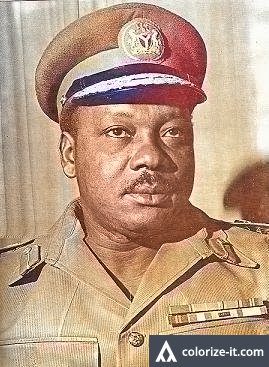Johnson Aguiyi-Ironsi, a pivotal figure in Nigerian history, rose to power after a successful coup. His leadership marked a significant shift in the country’s political landscape. Despite his efforts to unite a fractured nation, his tenure was tragically cut short. Aguiyi-Ironsi’s legacy continues to spark debates and discussions among historians and citizens alike. Let’s delve deeper into the life and times of Johnson Aguiyi-Ironsi, shedding light on his impact on Nigeria’s complex history.
Exploring the Legacy of Johnson Aguiyi-Ironsi
Welcome, young historians! Today, we are going on a fascinating journey through the life and times of a remarkable Nigerian leader, Johnson Aguiyi-Ironsi. Strap on your learning caps as we delve into the inspiring story of a man who left a lasting impact on his country and its history.
The Early Years of a Future Leader
Johnson Aguiyi-Ironsi was born on March 3, 1924, in Umuahia, Nigeria. From a young age, he showed great potential and a natural aptitude for leadership. Growing up in a time of immense change and struggle for independence in Nigeria, Aguiyi-Ironsi witnessed firsthand the challenges faced by his people.
As a young man, Aguiyi-Ironsi was determined to make a difference. He pursued his education with vigor, excelling academically and honing his skills as a military officer. His early experiences would shape his future path and prepare him for the challenges that lay ahead.
Rising Through the Ranks
After joining the Nigerian Army, Aguiyi-Ironsi quickly distinguished himself as a capable and dedicated soldier. His leadership qualities were evident to all who served alongside him, and he rose through the ranks with remarkable speed.
Aguiyi-Ironsi’s commitment to his country and his fellow soldiers earned him respect and admiration. He was known for his integrity, courage, and unwavering dedication to the Nigerian people. As he climbed the military ladder, he never lost sight of his roots or his responsibility to lead with honor and compassion.
A Time of Turmoil and Transition
As Nigeria struggled to find its footing in the aftermath of gaining independence, political turmoil and ethnic tensions threatened to tear the country apart. In the midst of this uncertainty, Aguiyi-Ironsi found himself thrust into a position of great responsibility.
In January 1966, following a military coup, Aguiyi-Ironsi assumed leadership of Nigeria as the second Nigerian military head of state. His tenure was marked by a commitment to unity, stability, and progress. Despite facing numerous challenges and opposition, Aguiyi-Ironsi remained steadfast in his resolve to steer Nigeria towards a brighter future.
Champion of Unity and Progress
One of Aguiyi-Ironsi’s most enduring legacies was his unwavering dedication to national unity. He believed in the strength of a united Nigeria, where people of all backgrounds could come together in harmony and cooperation.
During his time in office, Aguiyi-Ironsi worked tirelessly to promote understanding and reconciliation among Nigeria’s diverse ethnic groups. He sought to bridge divides and foster a sense of common purpose and identity that transcended tribal loyalties.
Tragedy and Legacy
Tragically, Aguiyi-Ironsi’s tenure as head of state was cut short by another military coup in July 1966. His life was taken in a violent and senseless act that shook Nigeria to its core. The loss of such a principled and visionary leader left a void that would be felt for years to come.
Despite the abrupt end to his time in power, Aguiyi-Ironsi’s legacy endured. His commitment to unity, his integrity, and his belief in the potential of a united Nigeria continued to inspire generations of Nigerians long after his passing.
Remembering Aguiyi-Ironsi
As we reflect on the life and legacy of Johnson Aguiyi-Ironsi, we are reminded of the power of perseverance, integrity, and compassion. His story serves as a testament to the enduring impact that a single individual can have on the course of history.
Let us honor the memory of this remarkable leader by carrying forward his vision of a united and prosperous Nigeria. May we draw inspiration from his example and strive to build a better future for all who call Nigeria home.
Thank you for joining me on this journey through the life of Johnson Aguiyi-Ironsi. Together, we can learn from the past and shape a brighter tomorrow for ourselves and future generations. Until next time, keep exploring, keep learning, and keep dreaming big!
Johnson Aguiyi-Ironsi: Did the General Deserve to Die?
Frequently Asked Questions
Who was Johnson Aguiyi-Ironsi and what role did he play in Nigerian history?
Johnson Aguiyi-Ironsi was a Nigerian military officer who served as the second President of Nigeria after leading a military coup in 1966. He played a significant role in Nigerian history by taking over leadership following the coup and attempting to stabilize the country amidst political unrest.
What were the major events during Johnson Aguiyi-Ironsi’s presidency?
During his presidency, Johnson Aguiyi-Ironsi faced challenges, including the aftermath of the military coup, ethnic tensions, and economic difficulties. He also implemented policies to address some of these issues, though they were met with mixed reactions from the public and the military.
How did Johnson Aguiyi-Ironsi’s presidency come to an end?
Johnson Aguiyi-Ironsi’s presidency ended tragically when he was overthrown and killed in a counter-coup led by younger military officers. This marked a turbulent period in Nigerian history and led to further political instability and violence.
Final Thoughts
Johnson Aguiyi-Ironsi, a pivotal figure in Nigerian history, played a crucial role during a tumultuous period. His leadership as the first military Head of State brought both stability and controversy. Despite his efforts to unite the country, his administration faced challenges, leading to his tragic end. Reflecting on Johnson Aguiyi-Ironsi’s legacy reminds us of the complexities of political leadership and the lasting impact it can have on a nation. In studying his tenure, we gain insight into the delicate balance between power and responsibility.




